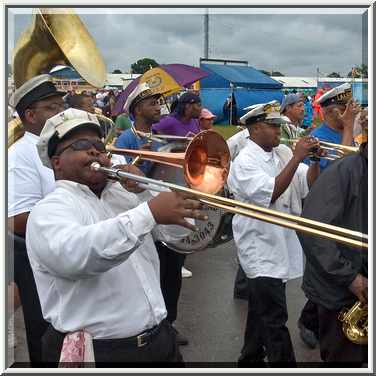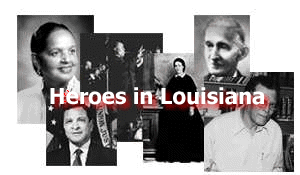in Louisiana

|
||||||||||||||||||||||||||||
 |
||||||||||||||||||||||||||||
Louisiana's African-American population is highly diverse, but three groups are most historically significant: Creoles of Color, blacks whose ancestors traveled to Louisiana from the East Coast, and Haitian immigrants.
Creoles of Color are generally descended from free persons of color--blacks who were free before the Civil War. Free persons of color, in turn, were usually descendants of Louisiana's first African slaves who had entered into common law marriages with white planters. Upon the dissolution of these liaisons, the planters often freed their mistresses and children and provided them with land, money, livestock, and, sometimes, slaves. Following the Civil War, the former free people of color began to identify themselves as Creoles--much to the dismay of the white Creoles. The community, which has retained this identity to the present, is currently enjoying a cultural renaissance, which has seen the flowering of Zydeco music.
 |
|---|
African-Americans whose ancestors lived along the East Coast constitute a large majority of Louisiana's African-American population. Shortly after the Louisiana Purchase (1803), the United States Congress banned the importation of foreign slaves into Louisiana. As a consequence, Louisiana slave dealers were forced to acquire slaves from elsewhere in the United States. Between 1805 and 1860, slaves making their way to the New Orleans slave markets were drawn primarily from the surplus slave populations of Virginia and the Carolinas. These slaves were sent to New Orleans from steamboat ports on the Ohio and Tennessee rivers, giving rise to the term "being sold down the river." In Louisiana (particularly southern Louisiana), the Virginia and Carolina slaves were distinguished from their native-born counterparts by language and religion. Unlike slaves born in Louisiana during the colonial era, the newcomers spoke English and were Protestants. The descendants of these slaves took Anglo surnames (such as Mitchell, Jones, and Handy) in the 1870 census to distinguish themselves from their former French-speaking owners.
Haitian immigrants have established a significant community in New Orleans over the past two decades. These emigrants from Hispañola are by no means the first to reach Louisiana. During a six-month period in 1809, approximately 10,000 refugees from Saint-Domingue (present-day Haiti) arrived at New Orleans, doubling the Crescent City's population. Approximately one-third of the refugees were free persons of color and an additional one-third were slaves (primarily domestics). The vast majority of these refugees established themselves permanently in the Crescent City.


